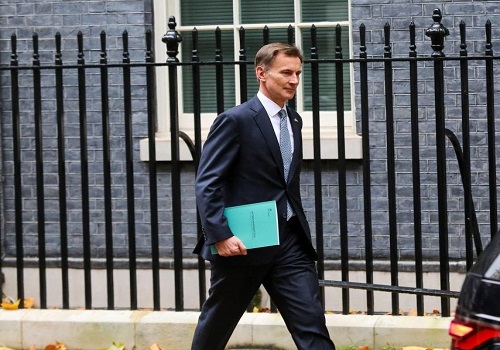UK Chancellor announces tax hikes, spending cuts to restore finances

Follow us Now on Telegram ! Get daily 10 - 12 important updates on Business, Finance and Investment. Join our Telegram Channel
UK Chancellor Jeremy Hunt Thursday announced a package of tax hikes and spending cuts worth 55 billion pounds ($65 billion) in a bid to improve the public finances and restore the country's economic credibility.
"Today we deliver a plan to tackle the cost-of-living crisis and rebuild our economy," Hunt told the House of Commons in his Autumn Statement 2022 on Thursday.
"Our priorities are stability, growth and public services."
To raise further funds, the threshold at which higher earners start to pay the top 45 per cent rate will be reduced from 150,000 pounds to 125,140 pounds, while the income tax, inheritance tax and national insurance thresholds will be frozen for a further two years until April 2028, Xinhua news agency quoted the Chancellor as saying.
To ensure that businesses making extraordinary profits due to the high energy prices also pay their fair share, the windfall tax on oil and gas companies will increase from 25 per cent to 35 per cent, with the levy remaining in place until March 2028, and a new, temporary 45 per cent levy will be introduced for electricity generators.
On public spending, according to the statement, departments will be expected to work more efficiently and support the government's mission of fiscal discipline.
From 2025-2026 onwards, day-to-day spending will increase more slowly by 1 per cent above inflation.
Amid the cost-of-living crisis, the Chancellor unveiled another support package.
While the government is capping typical energy bills for households this winter at 2,500 pounds, the Energy Price Guarantee will continue to provide support from April 2023 with the cap rising to 3,000 pounds.
Households on means-tested benefits, pensioners and people on disability benefits will receive new payments.
To ensure fiscal discipline, Hunt also introduced two new fiscal rules: the country's national debt must fall as a share of gross domestic product (GDP) by the fifth year of a rolling five-year period; and public sector borrowing in the same year must be below 3 per cent of GDP.
Overall, according to the government, the fiscal plan improves public finances by 55 billion pounds by 2027-2028.
The budget squeeze comes after a large-scale package of unfunded tax cuts announced by the government in September threw financial markets into turmoil as the fiscal giveaway measures were expected to ramp up public borrowing and they dealt a huge blow to the country's fiscal reputation.
























